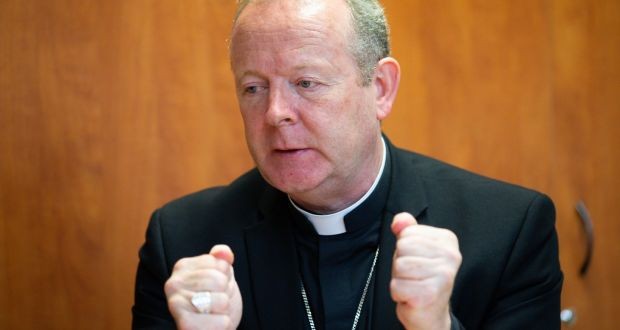Young people must be central to the conversation about Irish reunification, the Primate of All-Ireland has said in his new year’s message.
Archbishop Eamon Martin also warned that victims of the conflict in the North cannot be denied access to justice by controversial proposals from the British government on legacy issues.
“As we begin a new year, conversations are already taking place about what constitutional change and greater sharing on this island might look like,” the archbishop said in his message.
‘Intergenerational dialogue has much to offer these conversations – balancing reflection on the past with hope for the future,” he wrote.
On dealing with the past, the Archbishop of Armagh insisted that “the issues of legacy and the reality of trauma experienced by many families here must be included and handled sensitively in these conversations”.
The British government announced plans in July for a statute of limitations that would end all prosecutions for Troubles-related incidents prior to April 1998. The move has been widely criticised by campaigners representing those affected by the conflict.
Dr Martin warned that “victims have spoken about the importance of continued access to justice, together with meaningful opportunities for truth and information recovery.
“No line can easily be drawn on our past and there is clearly much work to be done in exploring and building a unity of hearts and minds towards a shared vision for our future in this island,” he insisted.
Reflecting on the service of rememberance to mark the centenary of partition in October – which provoked controversy when President Michael D. Higgins announced he would boycott the ecumenical event – Dr Martin said Church leaders were heartened by the involvement of younger generations.
“We were blessed that so many young people took part in that service in Armagh and they made such a refreshing and positive contribution – their presence and their youthful voices and singing were full of confidence and hope that they can be the ones to help to build the bridges necessary to overcome the mistrust and divisions of our past.
“During the service I expressed a personal sense of sadness and loss at the partition of Ireland and, with my fellow religious leaders, I acknowledged that perhaps we in the Churches could have done more to deepen our understanding of each other and to bring healing and peace to our divided and wounded communities,” the archbishop said of the ceremony.
On the issue of climate change, the Primate noted the important role people of faith played at the COP26 conference in Glasgow “reminding us of our responsibilities under God to be caring stewards of creation – always alert to the protection of life and the dignity of all and to the disproportionate impact that climate change is having on those who are already vulnerable and on the margins.
“These young people are strongly committed to dialogue and mutual respect between faith and science, while remaining determined to call out needless waste, ruthless exploitation and destruction of our planet’s resources,” he said.


 Michael Kelly
Michael Kelly Primate of All-Ireland Archbishop Eamon Martin.
Primate of All-Ireland Archbishop Eamon Martin. 